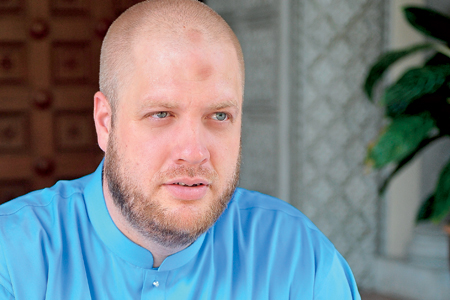
RNA - As CNN's Daniel Burke reports, the mosque in Roxbury was crowded past capacity, with about 1,200 college students, urban hipsters and East Africans lining the hallways and front stairs.
They wanted to hear Imam Suhaib Webb, resident scholar of the Islamic Society of Boston Cultural Center and widely considered one of the country's most influential Muslims, respond to Sam Harris and Bill Maher, who recently called Islam the "mother lode of bad ideas" and compared Muslims to the Mafia.
The lanky, blue-eyed imam, a convert originally from Oklahoma, is known for tackling taboo topics and spicing his sermons with pop culture references.
Before Friday's sermon, the last time the Roxbury mosque had been this crowded, Webb said, was when he preached about the finale of "Breaking Bad."
(On the Sunday after his sermon, Webb, who has extensive training in classical Islamic learning, answered religious questions on Twitter about "The Walking Dead.")
Instead of attacking Maher and Harris, though, Webb challenged his fellow Muslims.
"It's code red," he preached last Friday, pounding the minbar for emphasis.
"One day we're attacked by Fox News, the next day we're attacked by Muslims who actually pay to have Facebook ads about us," Webb said.
"I mean, that's the level of attacks that we're dealing with as a community and as a people. One brother told me, like what's going to happen next? It's like a soap opera."
Webb himself has been subject to some of those attacks, as conservative media outlets have sought to tie him to Alton Nolen, an Oklahoma man accused of beheading a co-worker, and the Tsarnaev brothers, suspects in the Boston Marathon bombing.
Webb said he never met the three men. "It's guilt by nonassociation," he said with a sardonic laugh.
At one point during his sermon last Friday, a man interrupted to argue that Muslims shouldn't care about what others say about them.
But when even avowed liberals like Maher and Harris lash out against Islam, Webb said, then it's time to worry.
"The last bastion of support we'll find in this country are among the liberals and some moderately conservative people," Webb said.
"What happened on that show that night was to challenge that community and its traditional support of religious minorities in this country, and if we don't think that's something we should be worried about, then basically we are building our own coffins."
Those are strong words, Webb acknowledged in a phone interview after his sermon, which was posted on YouTube last Friday. But necessary ones for American Muslims, who find themselves caught between Islamophobes and Islamists like ISIS, he said.
"No community survives that fails to identify itself," Webb said, "and right now the rhetoric and the perception of the Muslim community, whether we believe it or not, is not very good."
Instead, American Muslims frequently find themselves judged by how Islam is practiced overseas: stories about the group calling itself Islamic State, death sentences in Sudan, and restricted rights for women in Saudi Arabia.
"What is constantly invoked is that Muslims are bad because of what is happening overseas, or Muslims are good because of what is happening overseas," Webb said.
"In other words, we are being measured and weighed and determined by events that are completely outside of our hands."
Webb challenged Muslims to assert control of their image in three ways: by forging an American-Islamic identity, building institutions and shifting away from the view that male scholars have the final view on the faith.
"We need to appreciate the value of being seen as trusted ... that's the key to having a license to speak about religion," Webb said.
"It's a beautiful thing in this country: that if you want to talk about God, you have to be someone who has a certain type of character."
You can view Webb's full sermon here. In addition to his role as resident scholar at Boston's Islamic society, he is also founder of the Ella Collins Institute.
R111/108/C/